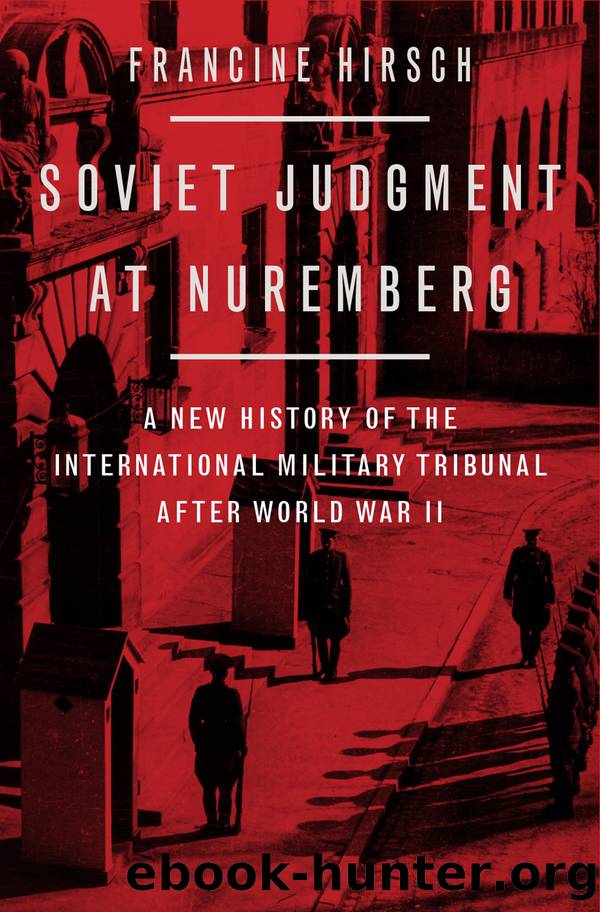Soviet Judgment at Nuremberg by Francine Hirsch

Author:Francine Hirsch
Language: eng
Format: epub
Publisher: Oxford University Press
Published: 2020-11-15T00:00:00+00:00
Chapter 10
In the Name of a Fair Trial
The month of March had gone badly for the prosecution in the Palace of Justice. The unexpected drama of the defense caseâthe self-righteous speeches of the defendants, the unending attacks on the Allied governments, the repeated challenges to the Tribunalâs legitimacyâhad profoundly shifted the mood in the courtroom and threatened to alter the trajectory of the trials. As April got under way and the days grew longer, Konstantin Gorshenin headed back to Nuremberg to assess the situation for Molotov and Stalin. Gorshenin had spent a hectic few weeks in Moscow, attending to his duties in the procurator generalâs office and weighing in on Soviet plans to participate in the Tokyo War Crimes Trial, which was being convened by eleven Allied nations in May to try the former leaders of the Empire of Japan. He had also conferred with the NKVD about the selection of witnesses to support the Soviet charges of German guilt for Katyn.1
Gorshenin, the deputy head of the Vyshinsky Commission, was the ideal Soviet bureaucrat: steadfast, unquestioning, hardworking, and loyal. The son of a railway worker from western Russia, he had risen through the Soviet system by virtue of his class background, intelligence, and grit. He had begun his career as a mechanic for the Kazan Railway in 1925, at age eighteen, and had thrown himself into Communist Party politics. In 1929, at a time of tremendous upward mobility for Soviet young people with proletarian backgrounds, he had studied labor law at Moscow University; a few years later he became deputy director for research at the Kazan Institute of Soviet Law. In 1937, at the height of the Stalinist Terror, he was nominated to a post in the Ministry of Justiceâand his career took off. He was named procurator general of the USSR in 1943 and launched a wartime campaign for labor discipline.2
As the designated problem-solver for the Soviet delegation in Nuremberg, Gorshenin had his work cut out for him. The first few weeks of the defense case had been hard on the whole prosecution; nobody had fared well against Goering. David Maxwell Fyfe later acknowledged that âGoeringâs appearance and vanity had been such a gift to the cartoonists that we had been inclined to underestimate his ability.â3 The Ribbentrop defense, however, had highlighted the shortcomings of Soviet trial techniques outside the controlled environment of a Soviet courtroom. Rudenkoâs method of cross-examination was a blunt instrument that did little to shatter the defendantâs composure and produced not much more than disdainful denials. The Soviets had no experience with Western-style cross-examination, no sense of how to use its give-and-take to trip up a defendant or to produce a compelling narrative. Unused to having to convince anyone, including the judge, of a defendantâs guilt, they had anticipated cross-examinations as little more than guided public confessionsâand had difficulty adapting when a defendant flatly denied his guilt or otherwise tried to throw things off track.4
Gorshenin had gotten his orders to return to Nuremberg from the highest levels of the Party.
Download
This site does not store any files on its server. We only index and link to content provided by other sites. Please contact the content providers to delete copyright contents if any and email us, we'll remove relevant links or contents immediately.
| Africa | Americas |
| Arctic & Antarctica | Asia |
| Australia & Oceania | Europe |
| Middle East | Russia |
| United States | World |
| Ancient Civilizations | Military |
| Historical Study & Educational Resources |
Never by Ken Follett(2880)
The Man Who Died Twice by Richard Osman(2299)
Machine Learning at Scale with H2O by Gregory Keys | David Whiting(2291)
Fairy Tale by Stephen King(2069)
Will by Will Smith(2042)
Rationality by Steven Pinker(1765)
The Dawn of Everything: A New History of Humanity by David Graeber & David Wengrow(1570)
The Dark Hours by Michael Connelly(1570)
Principles for Dealing With the Changing World Order: Why Nations Succeed and Fail by Ray Dalio(1373)
Friends, Lovers, and the Big Terrible Thing by Matthew Perry(1327)
A Short History of War by Jeremy Black(1300)
HBR's 10 Must Reads 2022 by Harvard Business Review(1256)
Go Tell the Bees That I Am Gone by Diana Gabaldon(1234)
Can't Hurt Me: Master Your Mind and Defy the Odds - Clean Edition by David Goggins(1227)
515945210 by Unknown(1207)
Fear No Evil by James Patterson(1109)
443319537 by Unknown(1072)
Works by Richard Wright(1018)
Going There by Katie Couric(991)
